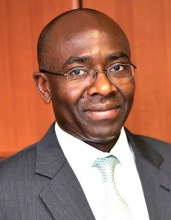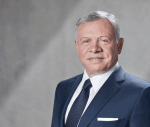You are here
Macron and the future of Françafrique
Jul 26,2023 - Last updated at Jul 26,2023
CAIRO — In early March, French President Emmanuel Macron visited four African states, Gabon, Angola, Congo, and the Democratic Republic of the Congo, on the resource-rich Gulf of Guinea. The trip, his 18th to Africa, was aimed at countering China and Russia’s charm offensive on the continent: both countries are bolstering their presence in places once considered part of France’s sphere of influence, pré carré français.
Before embarking on the tour, Macron candidly admitted that France was in a “period of transition” with its African partners, as it worked to develop relationships built on more than just security. But he was quick to add that none of France’s six military bases on the continent would be shut down as part of this rebalancing, underscoring the challenges that African countries face in disentangling economic growth and development objectives from security concerns, to which they have long been subordinated.
Macron’s insistence on the need to maintain France’s military presence in Africa (albeit with a smaller footprint) contrasts sharply with the views of young Africans, who are increasingly opposed to foreign military presence on the continent. Strangely enough, the French agree more with Africans than with their own president: a recent poll by the French Institute of Public Opinion (Ifop) found that 55 per cent of the French favour closing their country’s military bases in Africa.
The relationship between France and Africa exemplifies Benjamin Disraeli’s assertion in 1863: “Colonies do not cease to be colonies because they are independent.” The resilience of the French colonial umbilical cord is evident in several domains of development and statecraft, including security, economic and monetary policy, and foreign policy.
The war in Ukraine is a case in point. When, in March 2022, 25 of Africa’s 54 countries either abstained or did not submit a vote on the United Nations’ resolution condemning Russia’s invasion, Macron criticised their “hypocrisy”. Since then, France and other Western powers have deployed immense financial and diplomatic resources to support Ukraine, in stark contrast to the crisis in the Sahel. For more than a decade, terrorist groups have been destabilising the region, laying waste to countless communities. Yet, this issue has received scant attention globally, and the West has been unable to respond effectively.
Besides demonstrating the lopsided global response to conflicts in Europe, the Ukraine crisis has also highlighted the imbalance between France’s dealings with Russia and its engagement with former colonies. In 2021, French foreign direct investment in Russia was more than $3 billion, dwarfing its total FDI in former African colonies, estimated at a paltry $268 million.
Even more interesting is the composition of these investments: France’s FDI in Russia has a strong manufacturing component, which is highly labour-intensive and better at delivering inclusive growth than natural-resource extraction, the main focus of such inflows to Africa. At the St. Petersburg International Economic Forum in 2018, Macron boasted that “French enterprises employ 106,000 Russian citizens.” Before divesting from the sanctioned country, French automaker Renault alone employed 45,000 Russians.
While Renault helped create thousands of jobs in Russia, streets in France’s former African colonies are congested with imported cars, a major source of these countries’ external imbalances. This excessive reliance on imports increases the region’s vulnerability to global volatility, exports jobs, and, in some economies, has generated unemployment rates above 20 per cent, which only fuels the northward migration that European states have been seeking to curb. On the other hand, many African countries possess the raw materials needed to manufacture cars, including the electric vehicles that will be crucial in the fight against climate change.
Equally damaging is the CFA franc, which, unlike sterling and escudo, for example, persists as one of the most visible relics of colonialism. Established in 1945, the French-backed currency is pegged to the euro and still used in two monetary zones in West and Central Africa. Macron attempted to reform the system in late 2019, announcing the replacement of the CFA franc with the “eco” in eight countries (although it has yet to be adopted). But even with this change, France’s guarantee continues to undermine monetary sovereignty and the currency’s peg with the euro continues to undercut competitiveness and industrialisation.
These adverse effects of the colonial development model of resource extraction have impeded diversification and left Africa’s real economy with the short end of the globalisation stick. Although Africa accounts for around 17 per cent of the world’s population, it accounts for only 3 per cent of world exports in a rapidly changing global economic environment where trade has been largely driven by manufactured goods with increasing technological content.
The social costs are immense. The French multinational Orano (formerly Areva), for example, has been extracting Nigerien uranium for decades while receiving a range of tax breaks and benefits. This arrangement with its former colony has positioned France as one of the main uranium exporters and a global leader in nuclear energy, mitigating its exposure to shortages stemming from Europe’s restrictions on imports of Russian hydrocarbons. Yet, Niger remains one of the world’s most impoverished countries, less than 20 per cent of its population has access to electricity.
Albert Sarraut, the Colonial Minister for France from 1920-24 and 1932-33, best captured the intent of the imperial economy: “Economically, a colonial possession means to the home country simply a privileged market whence it will draw the raw materials it needs, dumping its own manufactures in return.” Even today, more than 80 per cent of African countries remain dependent on primary commodities and suffer disproportionately from recurrent balance-of-payments crises that undermine fiscal and debt sustainability.
In an increasingly competitive geopolitical environment, Macron’s ambition to redefine France’s role in Africa is to be welcomed. But any such effort must decouple security concerns from development goals and transcend neocolonial dynamics. In a world where technological innovation is accelerating and the divide between developed and developing countries is widening, African countries are seeking meaningful integration into the global economy. If the French fail to facilitate this process, plenty of other geopolitical actors are waiting in the wings.
Hippolyte Fofack is chief economist and director of Research at the African Export-Import Bank (Afreximbank). Copyright: Project Syndicate, 2023. www.project-syndicate.org













